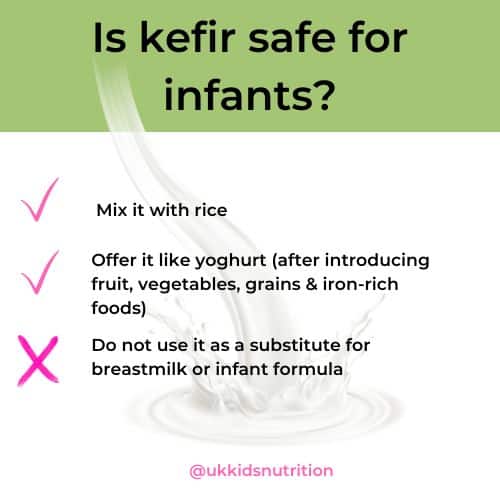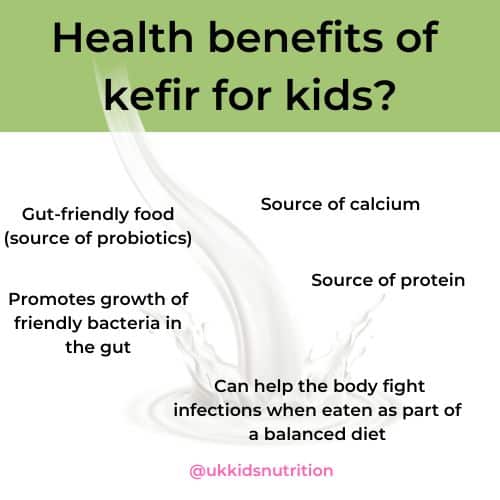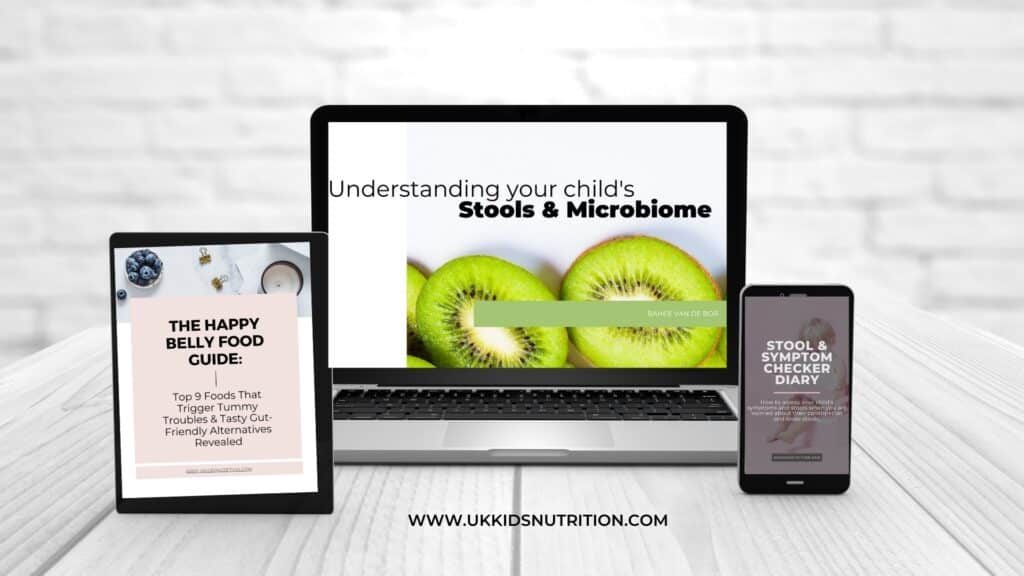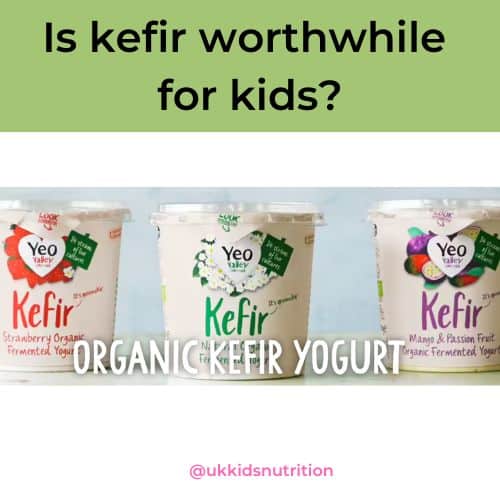Kefir for kids is a growing area of interest, particularly as the nutrients in kefir have been linked with various health benefits.
You may also have heard that the health benefits of kefir are superior to yoghurt!
So you wonder whether you should be offering kefir to your baby, toddler or older child.
If you’d like to explore the benefits of kefir milk for children then you are in the right place.
In this blog article, we’ll discuss whether kefir is good for children, kefir’s health benefits and how much kefir to drink.
What is kefir and is it safe for babies and infants?
Kefir is a fermented drink with a creamy consistency and slightly acidic taste.
Kefir can be prepared by fermenting milk from cow and goat milk with starter cultures containing kefir grains.
Did you know that kefir grains are not a grain?
Instead, it’s a symbiotic culture of lactic acid bacteria, yeast and acetic acid bacteria that stick to a polysaccharide matrix.
The kefir grains resemble chopped cauliflower in appearance.
How is kefir made?
Kefir grains can be added to milk or water to produce a thin fermented drink called kefir.
Once the milk has been fermented to kefir, the grains can be removed and reused to prepare a new batch.
The lactic acid bacteria in the grains break down lactose in the milk into lactic acid.
This gives kefir its sour taste (similar to natural yoghurt).
However, the texture is much runnier compared to yoghurt.
Kefir for babies – is Kefir safe for infants?
The health benefits of kefir milk might entice you to try kefir for kids, but I’m sure that you are wondering whether kefir milk is safe for infants.
As kefir for kids is prepared using cow’s milk, you are right to be cautious.
Unfortunately, kefir is not safe as the main drink for babies and infants under 1 year of age.
Kefir milk or water is not a nutritionally complete drink for babies.
For this reason, offer breastmilk which is also a rich source of both pre and probiotics.
If your baby drinks infant formula, offer this as their main drink until your child reaches their first birthday.
Although infant formula may have prebiotics added, most infant formulae do not contain live probiotics.

When to introduce kefir to baby
Once your baby is 6 months of age and has tried the fruit, vegetables and iron-rich foods and grains, you can offer kefir to baby.
You can add kefir to breakfast cereals (like you would whole cow milk) or mix it into rice to make ‘yoghurt rice’.
This is a safe way of offering kefir to babies.
For more information on weaning, see How To Get The Most Out Of Weaning At 4 Months and at 6 Months.
Is kefir good for children?
Source of probiotics
Kefir can provide a variety of different health benefits associated with it.
Kefir contains beneficial bacteria called probiotics with an assortment of strains present.
The different probiotic species in kefir have been linked with a variety of health benefits in adult literature.
Did you know that kefir is significantly richer in probiotics than yoghurt?
There are certain probiotic species present in kefir that may also help manage acute diarrhoea.
How?
When children drink kefir regularly, the various probiotics within kefir can aid the growth of friendly bacteria in children’s gut.
The two key beneficial bacterial families are Lactobacillus and Bifidobacterium.
These are the two major bacterial genera known to modulate the gut microbiome to reap the associated benefits like the management of acute diarrhoea.
There is also some laboratory-based evidence that proteins in dairy milk may also uniquely help facilitate the growth of Bifidobacterium and Lactobacillus.
Read more on probiotics in 12 Best Probiotics for Kids.

What are the benefits of kefir for kids?
Once your baby is one year of age, toddlers and older children can start to enjoy kefir milk prepared from whole milk as a drink.
Studies have shown that kefir has beneficial effects on digestive problems like lactose intolerance.
This is because kefir is made from grains containing live bacteria and cultures which break down and help digest the lactose present in milk kefir.
The research, therefore, suggests that the probiotic bacteria present in kefir can increase the body’s ability to digest lactose.
Source of calcium, protein and other nutrients
One of the health benefits of kefir for kids is that it is a natural source of calcium which is required for the development of strong bones and teeth.
Kefir can also be a source of vitamin D, also required for healthy bones and a robust immune system.
Finally, kefir is a source of protein which growing children need for its role in repairing and maintaining muscle tissue as well as for children’s growth.
Is milk kefir lactose free?
Unless the packaging states that your chosen brand of kefir is low in lactose, sadly there will be lactose present in milk-based kefir.
Older children who struggle with lactose intolerance may still be able to tolerate 1-3 tablespoons of kefir with their meals.
Individual tolerance will vary depending on how much lactose the child can usually tolerate in one sitting.
The good news is that most water-based kefir or dairy-free kefir will not contain cow’s milk proteins and lactose.
However, do check the ingredients list for words that indicate lactose or milk if your child requires low lactose or dairy-free diet.
Is kefir low fodmap?
Kefir is usually a milk based drink enriched with probiotics.
You may be considering using kefir for IBS symptoms such as bloating or loose stools.
Please note that fermented milk-based kefir is not low fodmap.
This is because kefir milk for children is usually high in lactose at a serving of 200 ml.
If you know that your child is lactose intolerant, water based kefir drinks can be a good alternative.
Just remember to always check the ingredients for other high fodmap ingredients.
Also, remember that not all children with irritable bowel syndrome struggle with lactose and high fodmap foods.
This is exactly why it’s important to know your child’s trigger foods so that foods are not avoided unnecessarily.

Is kefir good for IBS?
As kefir is a rich source of probiotics it is a gut-friendly food and can be good for IBS.
This makes it an excellent food to include in your child’s diet if they struggle with constipation or diarrhoea.
Having said that, as mentioned above, if your older child has difficulty digesting lactose it’s best to try kefir in small amounts and gradually increase quantities based on how much they can tolerate without triggering symptoms.
Learn more about IBS Kids Mastery Method 1:1 Programme.
Kefir and antibacterial properties
Kefir contains a unique type of probiotic called Lactobacillus kefiri.
This probiotic is thought to protect the body against infections from various harmful bacteria like Salmonella, Helicobacter pylori and E coli.
The literature suggests that yoghurt and kefir can reduce the growth of Bacteroides fragilis, a type of bacteria often associated with diarrhoea and inflammatory bowel disease.
Kefir health benefits and allergies
Kefir for kids might have other potential health benefits in the area of food allergy.
This includes protection from its anti-inflammatory properties and antioxidant protection for health problems like childhood asthma and food allergies.
A growing body of evidence suggests that gut dysbiosis which is a microbial imbalance of the intestine is associated with inflammatory and immune-mediated diseases.
The human microbiota is a key contributor to many aspects of human health and its composition and diversity are largely influenced by diet.
Including kefir milk for children early as part of their diet could potentially influence their susceptibility to some health conditions.
Regular consumption of fermented foods like kefir for kids could be one method of influencing the gut microbiota positively from an early age.
How much kefir to drink?
There are no official guidelines on how much kefir to drink.
You can offer kefir milk to children with their breakfast cereal or as a drink on its own as often as you like.
Kefir for children can be treated a little bit like yoghurt.
You can offer it as a snack once a day or as a small drink with their main meal.
Just remember that kefir should not be offered as the main drink for infants.
Smaller quantities of kefir can be offered to infants with solids as described earlier in this article.

Examples of kefir for children
Here are a few brands we regularly buy simply because the children enjoy them.
Yeo Valley Kefir Yoghurt
We love this particular product because it is low in added sugar at under 10g sugars per 100g.
The brand use 14 different varieties of probiotic strains from the Bifidobacterium and Lactobacillus family.
We also love that it is available in a few different flavours so it’s an easy choice as kefir for children.
In its yoghurt style, it’s brilliant served over breakfast cereals.
Bottomline
Encouraging kefir milk for children could be worthwhile in the long term due to its health promoting ingredients.
The health benefits of kefir for kids are largely down to the beneficial bacteria with probiotic properties. If children are willing to drink kefir, then it can be offered safely as part of a well-balanced diet.
If your child does not enjoy kefir, then try not to worry. You can offer yoghurt as an alternative but note that it does contain significantly less advantageous bacteria compared to kefir.
Let Me Help
Is your child struggling with constipation, bloating or loose stools?
Then either one of my programmes below will help.